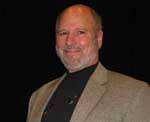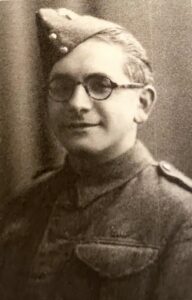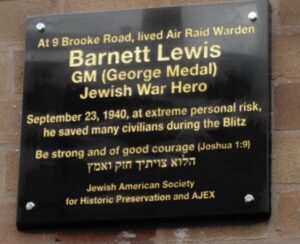By Jerry Klinger


BOYNTON BEACH, Florida — I had never heard of Barnett Lewis. As an American, why should I? Today, too many Brits, Jewish and Non-Jewish, no longer know Lewis’ story either.
Memory fades. In Britain and in the U.S., like a phoenix of evil, old, false, antisemitic canards are re-emerging. One common canard is Jews did not and do not expose themselves to danger. They let others take the risk.
Martin Sugarman is the chairman of JASHP’s, the Jewish American Society for Historic Preservation, U.K. Branch. He is an educator, an accomplished author of numerous books and articles on British Jewish history with an emphasis on the British Jewish experience in World Wars I and II. He is the very respected archivist of the (British) Association of Jewish Ex-servicemen and Women.
Martin and I work very smoothly together. We understand the risks of forgetfulness, the danger in not confronting hate. Together we implement JASHP’s motto, Shaping the Future by Remembering the Past.
Some confront the world’s oldest hatred, antisemitism, by making movies. Others write books, letters to the editor, create websites and give zoom courses.
JASHP creates visible, permanent, historical markers that reflect the contributions of Jews to their community and their country. The markers will do their jobs for decades, probably longer.
I once did a marker in Keokuk, Iowa, the site of the first permanent Jewish House of Worship in Iowa. The next morning, I got up to look at the marker across the street from the Court House. A young woman, with a baby on her hip, was standing in front of it reading the story.
She turned to me and said, “I did not know there were Jews here.” The Jews had long departed Keokuk. The marker was doing and will do its job, affirming Jewish historical legitimacy and presence.
Martin shared with me Barnett Lewis’ story for a potential project. He summed it up in powerful way that could not be refused or misunderstood on either side of the Pond’s Jewish experience.
“So it was that a Yiddishe boy just one generation on from poor Russian Jewish immigrant parents who spoke no English, was decorated by the King of England with one of our highest awards for bravery.”
Lewis was a good story, an important story to remember.
Barnett Lewis was born in Stepney, April 7, 1912. Stepney is part of the East End of London. In 1912 Stepney was desperately impoverished, overcrowded and very Jewish, similar to New York’s Lower East Side.
Lewis, his name was anglicized, was born to Yehuda Karbatznick and his wife Chaya. Of the Karbatznick’s eight children, Barnett was the only boy. The family was desperately poor, deeply religious Yiddish speaking Jews who had fled from Dokshitsy, near Minsk in Belarus because of horrific antisemitism. Their London home did not have running water, gas or electricity. An earth closet was their only toilet.
Their Stepney home was poor. Their Stepney home was free from the boot on their neck, Russian Jew hatred. They raised their family to be good citizens of their new land and loyal subjects of the King.
As the dark clouds of fascism drew menacing and war became a reality for Britain, Lewis, as did Jews across the U.K., volunteered to serve in any way he could. By 1940, he was considered too old for the regular army.
 He joined the ARP – the Air Raid Precautions service as a Civil Defense Warden.
He joined the ARP – the Air Raid Precautions service as a Civil Defense Warden.
The German Blitz, the Nazi saturation bombing of London designed to break the soul and spirit of the British, was in its full viciousness of killing.
September 23, 1940, German bombs smashed into a residential pub in Manor Park, Newham, a few blocks from where Lewis was stationed. Beneath the pub was a bomb shelter with 60 people trapped inside. The building burning, collapsing. A water main burst. The basement shelter was flooding, threatening to drown any survivors.
Lewis and a colleague ran to the site.
The London Gazette reported the story.
“A large HE bomb fell on three shops under which were two public shelters containing over 60 persons. The roof of the shelter collapsed. The bomb also caused a water main to burst which flood them to a depth of approximately two and a half feet before it could be turned off. Those who were not injured were quickly got out, but one man was trapped and in danger of being drowned, while four other men were pinned by the legs.
Lewis waded through the water to the first man and finding that he was wedged in with large pieces of brickwork and timber; (he) jacked up the dangerous roof and by sheer strength forced the brickwork away. he then found that the timber was still holding the man down. He crawled back and obtained a saw with which he cut this away, thus freeing the man just as the water reached his head. Lewis no doubt saved his life.”
Lewis, though at great and continuing risk to his own life, returned numerous times to the burning building as it was collapsing about him to save multiple people. 32 people had been killed. 28 would be saved.
Lewis was commended for the George Medal, the G.M. It is second only to the George Cross, equivalent to the American Congressional Medal of Honor.
To his surprise, for doing what he only felt was his duty, Lewis was presented to the King of England at Buckingham Palace. The King personally pinned the George Medal to him.
Lewis joined the regular army and was posted as an arms instructor attached to the Royal Fusiliers and Middlesex Regiments at the Machine Gun Training Centre. Ever modest, he would not wear his GM ribbon. He was ordered to do so by his Commanding Officer as an example to the younger men he was training.
 The text of the marker reads:
The text of the marker reads:
At 9 Brooke Road, lived Air Raid Warden
Barnet Lewis
GM (George Medal)
Jewish War Hero
September 23, 1940, at extreme personal risk,
He saved many civilians during the Blitz.
(Hebrew)
Be strong and of good courage (Joshua 1:9)
Jewish American Society
For Historic Preservation and AJEX
The Lewis historical marker project is the tenth in a series of Jewish British historical markers that have been created. They are direct rebuffs to the growing antisemitic sentiments that denigrates Jews in the U.K. and worldwide.
More projects are in development.
*
Jerry Klinger is the President of the Jewish American Society for Historic Preservation. www.JASHP.org